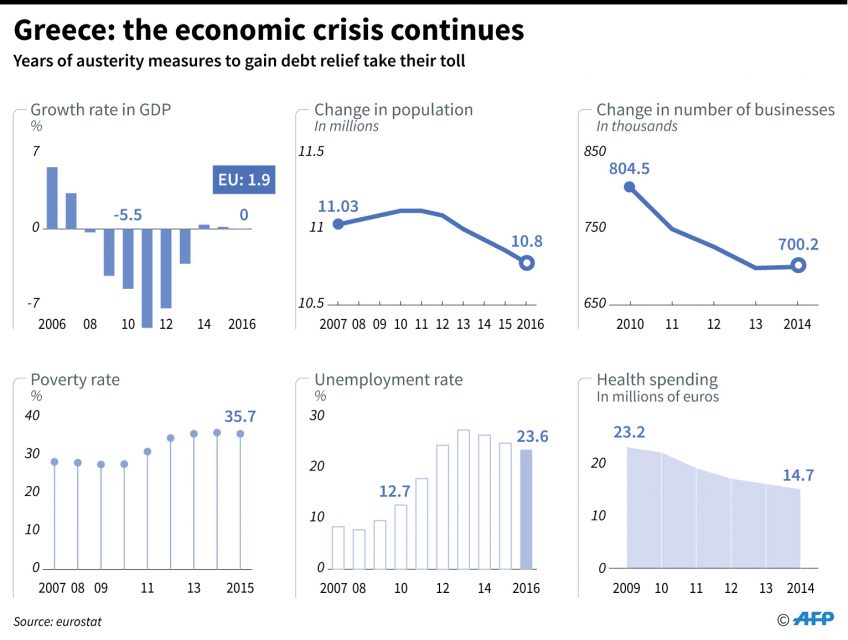
by Catherine Boitard
Agence France-Presse
ATHENS, Greece – As Greece’s government Friday welcomed a long-delayed bailout agreement, analysts warned the deal throws responsibility back on the struggling country to pull itself out of crisis.
Greek Prime Minister Alexis Tsipras said the agreement — hammered out by the International Monetary Fund (IMF) and eurozone finance ministers — opens the way to a “final exit to the crisis.”
Reached Thursday, the deal averted another summer of Greek crisis by clearing the way for seven billion euros of debt repayments due in July.
Payment of the latest tranche of Greece’s 86-billion euro ($97-billion) bailout, agreed in 2015, had been held up for months by a row over its needs for debt relief which has pitted bailout-weary Germany against the IMF.
But some analysts reacted lukewarmly to the deal. They objected that it relies on optimistic financial projections and fails to provide longer-term reassurance to markets about Greece’s debt and the health of its economy.
“Creditors will need to make more realistic forecasts and grant the debt relief that this implies is needed to convince financial markets that Greek debt is sustainable and allow it to finance itself,” said Jennifer McKeown, economist with Capital Economics.
Looming over the deal is the question of Athens’ debt, which stands at a staggering 180 percent of annual output after three bailouts.
But with only a few months before the legislative elections in Germany, Berlin ruled out making any further commitments to debt relief.

‘Grexit’ averted, nothing won
The “Grexit danger has been reduced again,” but “Tsipras won nothing,” business think tank Iove director Nikos Vettas told AFP.
Now it is up to the Greeks to pull the country out of its slump, added Vettas.
Greek media outlets spent Friday puzzling over the question of whether the glass is “half empty or half full,” said Panayotis Petrakis, economy professor at the University of Athens.
“The agreement is positive and makes it possible to more toward the future,” he said.
But he added that the budgetary objectives through 2060 drawn up by eurozone finance ministers point to a “miraculous future.”
“There will be a lot to do,” in order to maintain commitments while many questions remain about the country’s debt and future growth, added Petrakis.
France had at one stage pushed for linking debt relief to growth of the economy, along with larger loans.
But IMF chief Lagarde has said Greece’s debt is not sustainable and that the country would require significant debt relief from Europe before the fund could approve a new loan program.
A longstanding supporter of debt relief for Greece, French President Emmanuel Macron welcomed the deal Friday, but said he expected to revive some of France’s past proposals soon.
“It was important to have this agreement at this stage to get the necessary financing to support Greece with the reforms that it has put in place which were difficult reforms,” Macron said.
“We will need to return to the subject of Greece in the coming months and inevitably some of the proposals that France has made will come back,” he added.
The European Central Bank Friday welcomed the deal, saying it was an initial step towards ensuring sustainability of the country’s debt.
‘Flying lessons for a pig’
But former Greek finance minister Yanis Varoufakis was quick to offer some sharp criticism Friday, calling the agreement tantamount to “offering flying lessons to a pig.”
He termed the deal as “added austerity that will further push Greeks into dispair” blaming a current recovery plan for a surge in unemployment and poverty.
Varoufakis had resigned in July 2015 in protest of the country’s acceptance of Germany-inspired budgetary planning.







